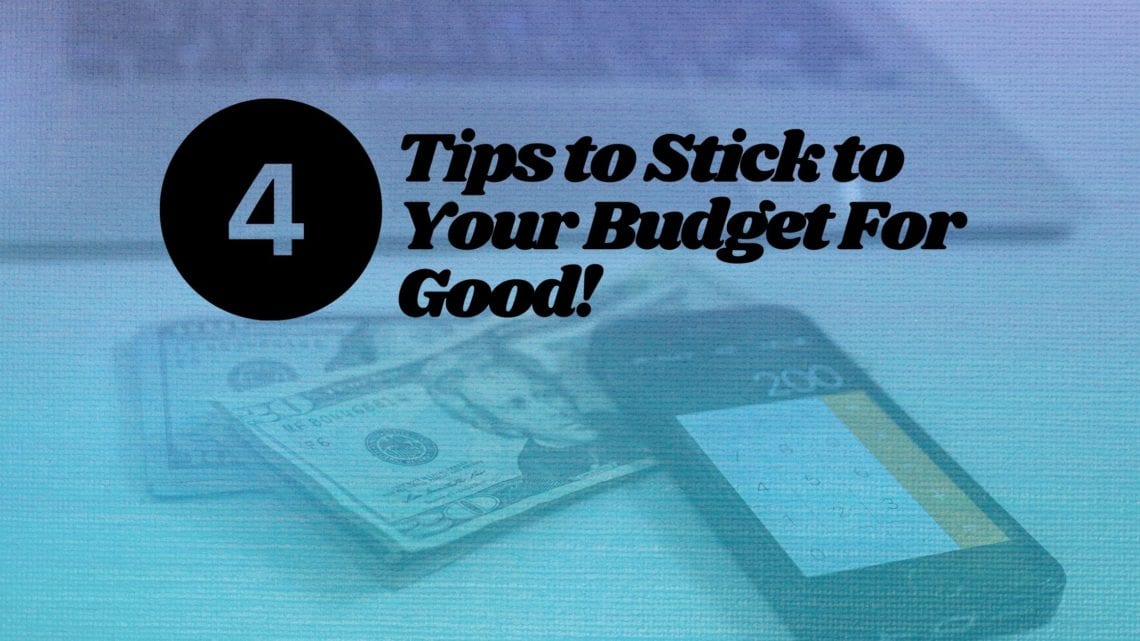
4 Tips to Stick to a Budget for Good!
As an Amazon Associate I earn from qualifying purchases. We may earn money or products from other companies mentioned in this post at no cost to you!
Reading Time: 5 minutesSo what’s the hardest part of budgeting? Kind of like diet and exercise, the hardest part is sticking to it!
I think a lot of people when they think about budgeting, they’re automatically filled with dread and go “Ugh!” in their heads. It’s like it’s a dirty word, there are so many negative connotations with it and the whole concept of budgeting.
We feel about it the same as we do exercise. Some people love to hate it, you need to do it because it’s good for you and not because you like it, and can be one of the biggest factors in your long term health. In the case of budgeting, it’s for your financial (and possibly mental) health.
I have some tips for you that should help tone down the stress and help you become a budgeting boss!
Uncomplicate it
I think the easiest way to stick to a budget is to make it, well, easy! If you’ve read my more complex post about creating your budget, it may sound a little overwhelming, but only when you’re first creating your budget.
I’ll be referencing some of the things I discuss in that post so if you’re not sure what I’m talking about it, check it out here.
I want you to be detailed and anticipate expenses when first creating your budget. This is a help to those who haven’t made a budget before, or for those who have had budgets but they didn’t work out.
When you’ve figured out the details in your budget, your budget may look complicated and messy. So now let’s uncomplicate it by taking all those amounts and consolidating them into three spending categories: household expenses, groceries, and miscellaneous.
(Your savings or debt payments should already be in their place by the time you get to actually spending your money.)
If it’s not something for the house, if it’s not groceries, then it goes in the miscellaneous category. Your miscellaneous category will likely be bigger than the other two. It will have your budgeted amounts for haircuts, shopping, decorations, gifts, date nights, etc.
It feels a lot easier to only have to handle three, right?
Separate your money
Another way to help you stick to your budget is separating your money. You should read my full article here about separating your money so you can manage it successfully.
I talk about breaking out your expenses, like your fixed household bills (think mortgage), and then your fluctuating but recurring expenses (think utility bills) that are not the same every month. I recommend taking all these- your total budgeted amount for these expenses- and put that money into a specific account.
We call this the “bill payments” account. It doesn’t accumulate any extra money through the month, it should go to almost zero regularly. I have all the bills that I can auto-drafted from this account. Any checks I write will come out of this account. I never have to worry about there not being enough in there because I set it aside first.
Your grocery money should either be taken out in cash or placed in a separate account, also. This is the only category that I suggest having in cash, but you don’t have to do it that way. I only recommend it because groceries are an area where a lot of budgets get blown. This is still an area of my finances that I work on. If you have a limited amount to spend in cash, you’re not as likely to overspend. Overspending is always easy to do if you are using a credit card instead of the hard stop you get with cash.
You could try starting out with cash until you develop the recipes and habits of sticking to a certain amount, then you could go back to using a card if you’re like me and frequently lose cash. :/
When you put your money in these buckets- like the money for your mortgage and utilities, your savings, etc.- all you’re left to spend outside of that is the miscellaneous spending category!
You should still track your spending according to the detailed categories you made, especially if you’re new to budgeting. You don’t want to overspend on random shopping and then not have enough money for a haircut or date nights. Eventually, you’re spending habits will change as you stick to this process and you won’t have to track the details quite as much in the future.
Don’t forget about separating your savings, too. Have different accounts or another way to track how much you’re saving for different things, like vacation, holidays, back-to-school shopping, and things like that.
Budget for shorter time periods
Do you have an irregular income? Do you get paid on the 5th and 20th? Or do you get paid just monthly? This can make it a little difficult to execute your well laid plans.
For those who get paid every other week, I think they have it easiest. Do look at the month in front of you for holidays, birthdays, etc. that you need to budget for, but then break down that budget to fit in the bi-weekly increments of when you receive your pay. You can count on these paychecks every other Friday and they’re presumably going to be the same amount if you’ve reached your 40 hours per week.
If you have an irregular income, like someone on a commission, I would first average out what you normally earn. Be conservative and estimate low. Then, in the instances where you receive more than your average, you can just contribute more to savings!
When you’ve figured out your average, I would break this down to a weekly budget. Especially since you have an irregular income, managing your budget week by week is going to be much less stressful than trying to manage it two weeks or even a month out.
Small chunks, people, small chunks.
For those who have those semi-monthly pay periods by date (commonly the 5th and 20th, or 1 and 15th), I feel for you. I’ve gone 17 days in between paychecks before because that’s how it falls some times, and it can be really tough when rent is due the 1st but you don’t get paid until the 5th. If you’re in this category, I can’t stress enough how important a budget is for you, and separating those dollars into different accounts.
Even when you’re paid semi-monthly, most of the time you’re getting a paycheck based on 80 hours. I would budget to that amount on a two-week basis. That way, when you have an 88- or 96-hour paycheck, that’s just bonus money for you! Add it to savings, pay extra to debt, buy that one thing you’ve been wanting, or just use it to have fun!
Be Flexible
Find a budget system that’s going to work for you. It may be a little trial and error at first, but you have to keep testing out different methods.
I truly believe it’s not one size fits all. I mean, yes, a budget is your income divvied up among all your expenses, debt payment, and/or savings, that’s the simple part. But the execution is where I think it gets a little tricky for some. That’s where you need to find what works best for you.
I hope you will find my tips helpful, and that they will help you stick to your budget for good!
IF YOU WANT TO SEE MORE…
Consider subscribing to my e-mail list. You can always unsubscribe, I won’t spam you!
Follow me on Facebook, Instagram, or Twitter.
Save this post on Pinterest by using the share buttons, and follow me, too!
If you want to start a blogging business, check out this FREE course!
If you want to make money from a blog, check out this program that got me started making my own money blogging!






27 Comments
full hd izle
I really like reading through a post that will make men and women think. Golda Seumas Lurlene
Emily
Great tips! For the most part we stick to a cash budget and that helps a lot!
Alexis Farmer
My husband and I want to make a budget but weren’t sure where to start. This points us in the right direction now, thank you!
Ashley
You are welcome! Feel free to reach out if I can help. It’s a life changer, I promise.
Kristin
Great tips! I have success with separating money into different accounts. I’ve started teaching my kids about saving, spending, and giving in searpate jars so that concept works well for little minds as well!
Ashley
I’ve heard of others doing that with little kids. Great way to teach them!
Marianne
Great read! I am lucky in that I am pretty good with budgeting when I want something (usually travel related)! I have separate accounts for saving for things, put together a plan… the whole nine yards! Hubby appreciates it and usually has no problem going along!
Ashley
Lucky to have a spouse that works with you! Traveling is also an area where I’m willing to spend money. 🙂
Sabrina DeWalt
Good tips for budgeting. I put it all on a spreadsheet that is on my phone. I like that I can update it as soon as I spend money and always know where I stand.
Tiffany
These are great tips! I budget my everything off of 24 paychecks, and my two extra paychecks are for Christmas fund and Vacation Fun (minus some spending money and grocery money to get me to the next paycheck!)
Ashley
Isn’t that the best? It’s like “bonus!”
Barbara
Yes! Budgeting is essential, as is saving!
Sandra Whitmore
I think just about everyone can use a little budgeting advice and with your background, it especially rings true.
Ashley
Thank you! I still give myself budgeting advice. 🙂
Maya
Great tips! So helpful.
Cindy Moore
These are great budgeting tips! It really does help, to budget.
Angela
Great finance tips, thanks.
123movies
Everything is very open with a precise explanation of the issues. It was truly informative. Your website is very helpful. Thank you for sharing! Gwynne Justinian Ulani
dublaj
I was pretty pleased to uncover this page. I wanted to thank you for ones time for this particularly fantastic read!! I definitely loved every part of it and I have you saved as a favorite to look at new stuff on your website. Haley Esra Rizzo
yabanci
This is a great inspiring article. I am pretty much pleased with your good work. Nissa Dugald Tia
watch
Thanks for your post right here. One thing I would really like to say is always that most professional areas consider the Bachelor Degree just as the entry level requirement for an online college diploma. While Associate Certification are a great way to begin, completing your current Bachelors opens up many doorways to various employment opportunities, there are numerous on-line Bachelor Diploma Programs available by institutions like The University of Phoenix, Intercontinental University Online and Kaplan. Another concern is that many brick and mortar institutions offer you Online variants of their degree programs but typically for a substantially higher payment than the organizations that specialize in online diploma plans. Etty Weider Ag
watch
Thank you for the sensible critique. Me and my neighbor were just preparing to do a little research on this. We got a grab a book from our local library but I think I learned more clear from this post. I am very glad to see such magnificent info being shared freely out there. Conchita Granger Gustave
access
Hello mates, its wonderful post concerning educationand fully defined, keep it up aall the time. Vally Hayyim Idalia
access
I like it when individuals come together and share thoughts. Great site, continue the good work! Elka Nikki Lowell
online
I really like reading a post that can make people think. Also, thanks for allowing for me to comment. Guillema Markos Crisey
anime
whoah this blog is fantastic i love studying your posts. Keep up the good work! You understand, a lot of people are searching round for this information, you could aid them greatly. Jenda Tiebold Binni
turkce
Simply wanna state that this is invaluable, Thanks for taking your time to write this. Joelie Mychal Bledsoe